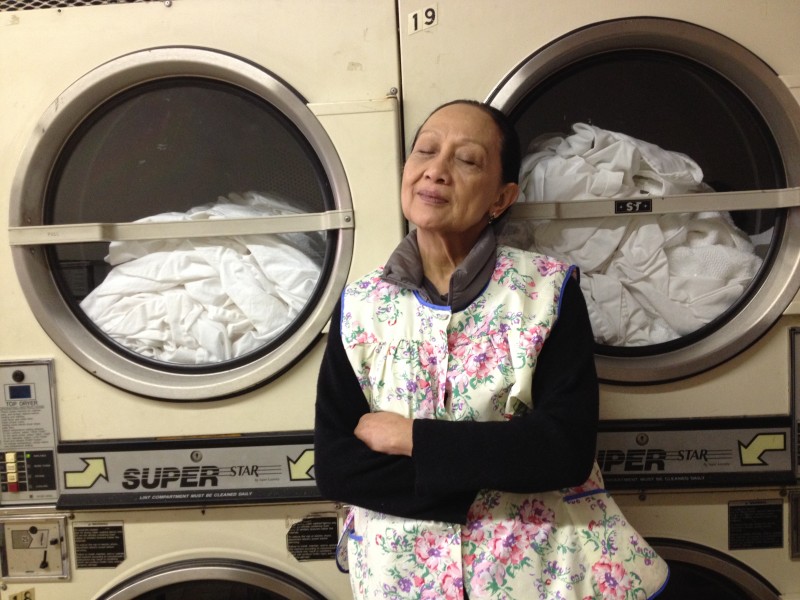Two Short Documentaries by Lynne Sachs: The Last Happy Day (2009) and The Washing Society (2018)
23 July 2020
By Filmcentric (Ewan the Cinema)
https://filmcentric.wordpress.com/2020/07/23/two-short-documentaries-by-lynne-sachs/

One of the special focus strands of the Sheffield Doc/Fest online programme in 2020 was the experimental documentary filmmaker Lynne Sachs, who has an extensive body of work across a number of different documentary interests. I watched two of her films out of the handful made available (some of the rest are still online for festival attendees, so I am determined to catch up with them), and present reviews below — or, maybe I should say, more impressionistic observances as I cannot claim they are as deeply considered as I would like.
The Washing Society (2018)
This isn’t a long film, clocking in at about 45 minutes, but it’s a curious blend of documentary and staged fiction. It films a number of New York laundromats, showing their working environments and including some comments by a number of the workers. However, it starts with a Black woman speaking an historical text and then places her in the space of a laundromat opening for the day, and throughout the film her presence functions as a sort of historical commentary making clear the racialised nature of this work, which is somehow so intangible and invisible to so many people. As the film progresses, the testimonies start to become more like monologues, rather more clearly delivered by actors, itself eventually seguing into a musical performance piece on the machines themselves.
CREDITS
Directors/Writers Lynne Sachs and Lizzie Olesker; Cinematographer Sean Hanley; Length 44 minutes.
Seen at home (Sheffield Doc/Fest Selects streaming), London, Saturday 4 July 2020.
The Last Happy Day (2009)
I find it sometimes very easy to criticize documentaries for following a standard talking heads format, but of course Lynne Sachs doesn’t even approach anything resembling the clichés of the form. This medium-length piece does, however, use occasional on-screen captions to contextualize her story of a distant relative, the Hungarian Jew Sandor Lenard (aka Alexander Lenard), who fled shortly before the outbreak of World War II and eventually found himself in Brazil, where he undertook Latin translations, including of Winnie the Pooh (sorry, Winnie Ille Pu). That said, her experimental practice means that it’s difficult to pick out everything that’s going on here, and I imagine wider viewing of her oeuvre would help more in that respect, but there seems to be an idea of the painful ruptures of war and exile being healed at least somewhat by language, or perhaps the idea of translation (given that the language in question is hardly a widely shared one). It’s a family story, too, so children in Sachs’ own family appear on screen to read Lenard’s letters or comment on them (very eloquently, given their age). These are ideas that come out, not inaccessibly, but in a dense mixture of text and image and voice.
CREDITS
Director Lynne Sachs; Cinematographers Sachs and Ethan Mass; Length 38 minutes.
Seen at home (Sheffield Doc/Fest Selects streaming), London, Tuesday 21 July 2020.
